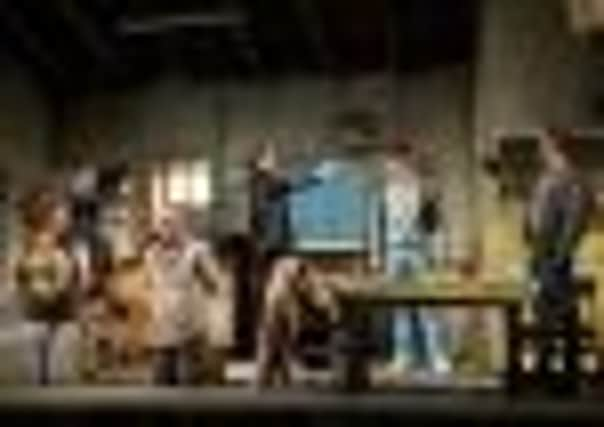Theatre reviews: The Lieutenant of Inishmore | Thatcher’s Children | Beats | Demos


THE LIEUTENANT OF INISHMORE
ROYAL LYCEUM, EDINBURGH
****


THATCHER’S CHILDREN *** BEATS
****
THE ARCHES, GLASGOW
DEMOS
TRAVERSE THEATRE, EDINBURGH
****
IF YOU are a person of sensitive disposition – or even just a moderately sentimental cat-lover – then it’s probably best to avoid the Royal Lyceum Theatre, over the next couple of weeks. Like his great predecessors JM Synge and Sean O’Casey, the London-born and Ireland-obsessed playwright Martin McDonagh is contemptuous of the wide-eyed tolerance for – and even admiration of – political violence and bloody murder that he detects in some corners of Irish culture. And in The Lieutenant Of Inishmore, first staged by the Royal Shakespeare Company in 2001, he satirises those attitudes in a ferociously bloody and hilarious black comedy, in which the violent death of a much-loved pussy-cat – the childhood pal of INLA terrorist Padraic – triggers a cycle of revenge so preposterously gory that audiences hardly know whether to laugh, cry, or wail like banshees.
The Lieutenant Of Inishmore is set in a classic cottage kitchen on one of the Aran islands, where Padraic’s old Dad, Donny, is minding the cat while Padraic is in Belfast, getting on with his self-appointed INLA task of torturing drug dealers. When Wee Thomas (the cat) is discovered on the road with his head stoved in, Donny is inclined to blame his slightly girly teenage pal Davey, who found the body. As a tearful Padraic comes storming home to avenge his pet, though, a much more sinister story begins to unfold.
Advertisement
Hide AdThe satirical possibilities of this yarn are clearly almost infinite, as McDonagh persuasively links the love affair with violence in Irish republicanism to a much wider postmodern western cult of infatuation with violent imagery, from slasher movies to horror films.
McDonagh is also a tremendous wit; and Mark Thomson’s Royal Lyceum production boasts a cast – led by Christoher Fairbank as Donny, and Peter Campion as Padraic – who never miss a beat in exposing the play’s fierce, purposeful comic rhythm. The soundscape of Irish folk tunes and rebel songs is perhaps, in the end, a shade too folksy; it needs a darker, more metallic postmodern undertone to carry the force of the drama. For those of strong mind, though, this is a fine and entertaining evening’s theatre; not pretty, but furiously funny, and to the bloody point.
If McDonagh’s play marks the final decay of an Irish revolutionary tradition run to seed, the young artists who gather around the Arches seem to be hatching a new revolution of their own. This year’s joint winners of the Arches’ Platform 18 award are performance artist Gary Gardiner and writer and actor Kieran Hurley; and both of their shows – now at the Traverse – are intensely political, in perspective and intention.
Gardiner’s Thatcher’s Children is a 60-minute attempt to get to grips – through sound, movement, text and video – with the legacy of Margaret Thatcher; and at the level of emotion and imagery, it creates some powerful moments. What the show lacks, though, is a really clear grasp of Thatcherite ideology, and its profound psychological and social implications; there’s a far more precise and devastating case than this to be made against the lady, and against all of us who – often unwittingly – have allowed her world-view to shape our lives, over the past four decades.
Kieran Hurley’s Beats, by contrast, is a more conventional one-hour monologue, written and performed by Hurley to expose one corner of the control-freak official culture which emerged in Britain after Thatcherism. Featuring live onstage DJ Johnny Whoop, and some fierce live video by James Wardrop, Beats tells the story of Johno, a shy 15-year-old from a Scottish new town coming of age at the height of the controversy over rave culture, and the banning of gatherings to listen to music “characterised by the emission of repetitive beats”.
Hurley’s story describes just one night in Johno’s life, when he heads off with his mates to attend a rave in some distant field. Through the prism of that 12-hour journey, though, Hurley offers us a memorable glimpse of a fragmenting society where joy and ecstasy – in the original sense – are in short supply, where new town hopes have turned to dust, and where people like Johno’s single Mum are tired and defeated at 40.
Advertisement
Hide AdThe balance between voice and music is sometimes not quite right; too little silence, too little respect for the words. The quality of Hurley’s writing and performance, though, make this an outstanding show; clever, ruthless, compassionate, and full of political insight.
At the Traverse, meanwhile, the Write Here festival of new work-in-progress stormed to a conclusion on Tuesday night with another intensely political event, in the shape of a scratch performance of a new piece by playwright Tim Price and Occupy activist John Bywater.
Advertisement
Hide AdThe aim of Demos is to offer audiences – who rapidly become part of the action – a choice between the tentative new form of democracy pioneered in the General Assemblies of the Occupy movement, and the familiar format of Prime Minister’s Questions at Westminster; and the result is a fascinating, traumatic, thought-provoking evening, in which I found myself channelling Dennis Skinner on the Labour backbenches, speaking the words of a well-intentioned female occupier, and watching one of my critical colleagues giving a knock-’em-dead performance from the dispatch box as David Cameron.
At the end, the Traverse audience seemed to prefer the new form of democracy to the old; but either way, I predict a substantial future for this clever and timely show, which links a changing theatre culture to the evolving politics of our time, in ways we are only just beginning to understand.
• The Lieutenant Of Inishmore is at the Royal Lyceum Theatre, Edinburgh, until 12 May. Thatcher’s Children and Beats are at the Traverse Theatre, Edinburgh, until Saturday.